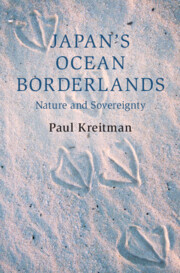Book contents
- Japan’s Ocean Borderlands
- Cambridge Oceanic Histories
- Japan’s Ocean Borderlands
- Copyright page
- Contents
- Maps
- Figures
- Acknowledgements
- Naming Conventions
- Maps
- Introduction
- 1 Bonins of Contention
- 2 The Race to Marcus Island
- 3 Bird and Sovereignty Conservation in the Northwest Hawaiian Islands, 1898–1911
- 4 Sand Dunes and Soldiers
- 5 Disaster
- 6 Resurrecting the Torishima Albatross
- 7 The Nature of the Senkaku Islands
- Epilogue
- Appendix Japanese Islands Abandoned, 1868–2013
- Select Bibliography
- Index
Epilogue
Islands and Oceans
Published online by Cambridge University Press: 06 July 2023
- Japan’s Ocean Borderlands
- Cambridge Oceanic Histories
- Japan’s Ocean Borderlands
- Copyright page
- Contents
- Maps
- Figures
- Acknowledgements
- Naming Conventions
- Maps
- Introduction
- 1 Bonins of Contention
- 2 The Race to Marcus Island
- 3 Bird and Sovereignty Conservation in the Northwest Hawaiian Islands, 1898–1911
- 4 Sand Dunes and Soldiers
- 5 Disaster
- 6 Resurrecting the Torishima Albatross
- 7 The Nature of the Senkaku Islands
- Epilogue
- Appendix Japanese Islands Abandoned, 1868–2013
- Select Bibliography
- Index
Summary
Although islands have long been geologically, ecologically, economically and strategically linked to oceans, they are now juridically linked to them, also. The UN Convention on the Law of the Sea grants states the right to claim exclusive economic zones projecting up to 200 nautical miles from their coasts, and continental shelves projecting up to 350 nautical miles. Bird islands have been transformed into anchors of pelagic sovereignty, leading to fierce diplomatic disputes over the legal definition of island-ness.
Nature conservation has also served as one means of forging new legal connections between islands and oceans, for in the past few years pelagic states have established a series of vast oceanic reserves anchored by bird islands. The US has expanded Roosevelt’s Hawaiian Islands Reservation into the Papahānaumokuākea Marine National Monument, and Britain has established the Chagos Islands Marine Protected Area in an attempt to protect the US military base on Diego Garcia. It is hard to find a more chilling example of nature conservation as a tactic for conserving sovereignty over territory.
Keywords
- Type
- Chapter
- Information
- Japan's Ocean BorderlandsNature and Sovereignty, pp. 232 - 242Publisher: Cambridge University PressPrint publication year: 2023



